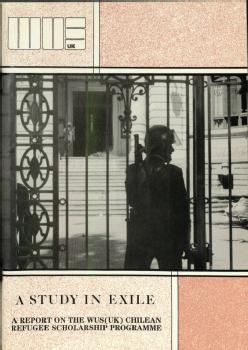Helping People Tell Forgotten Stories


The way ahead for collecting memories and remembering the past is through helping people tell forgotten stories

Professor Alison Ribeiro de Menezes, School of Modern Languages and Cultures, Warwick

I’ve always been interested in language – how there can be different ways of saying and thinking about things. It’s why I’m also fascinated by memory. Why do we remember some events more than others, and what is it that shapes how we think about them? These are the kinds of questions my work seeks to answer.
2023 will mark the 50th anniversary of the Chilean coup that brought General Augusto Pinochet to dictatorial power. As anniversaries do, it will pull the memories of those in the UK who watched the events of 1973 unfold on television back into focus. But there is a significant number of people in Britain who will recall things a little more personally.
Almost 3,000 refugees came to the country in the aftermath of the coup, and many of them remain here today. My fellowship, Voices of Humanitarianism: British Responses to Refugees from Chile, has explored some of their experiences – and, of course, their memories. And it wouldn’t have happened were it not for a conversation I had with my predecessor at Warwick, Emeritus Professor John King.
When you study the Hispanic world and are interested in questions of memory, your attention is naturally drawn to Latin America, where there have been so many issues of transitional justice and disappeared people over the decades.
I joined Warwick in 2012 as its first Hispanic Studies chair. One day, John reminded me that he was among the UK academics who helped Chilean refugees in the 1970s through the efforts of the World University Service (WUS), which supported more than 900 people to continue or complete their studies at British universities and polytechnics.
It was an opportunity that fell into my lap – a chance to highlight the plight of Chilean refugees and help people tell forgotten stories. Since then, I’ve interviewed both first and second-generation Chileans for the project. It has been both a responsibility and a real privilege. But it’s also not been without its challenges. I realised early on that the project meant different things in Chile than it did in the UK.
As academics over here, there are questions we’re interested in answering in – but sometimes they’re not the things that really matter to Chileans. When a representative of the Museum of Memory and Human Rights in Santiago visited our collections in Warwick, she pointed out that we had the mirror documents of trade union archives in Chile that had long been destroyed. It simply hadn’t occurred to us that the papers we were so familiar with could have an altogether greater importance back there. 
You have to build your credentials and use your connections carefully when you’re effectively entering such a close-knit community, hearing what are often very raw recollections, and becoming a custodian of people’s stories. Collecting these memories is incredibly important.
By bringing Chileans to Britain, the WUS saved many lives and set the groundwork for responses to other crises in the years that followed; some of the solidarity workers went on to roles with the Refugee Council and charities like Christian Aid and Oxfam. Yet when you compare the Chilean coup to crises like the Kindertransport, 1990s Rwanda or even Ukraine today, it just isn’t in our common consciousness or discourse in the same way.
I think we need to make sure that both the experiences of Chilean refugees and the grassroots support the British people gave them are not forgotten. To that end, I’m working on REWIND with a theatre group called Ephemeral Ensemble, who use real stories like the ones from my interviews to develop puppet and music-based plays that speak to topics like youth protest, activism and resistance.
Above all, I think we need to remember that memory isn’t a fixed thing.
The context of the present day always influences the way we reflect on the past, so we must consider how views have changed – and what it says about people, societies and the world of today.
modernlanguages
